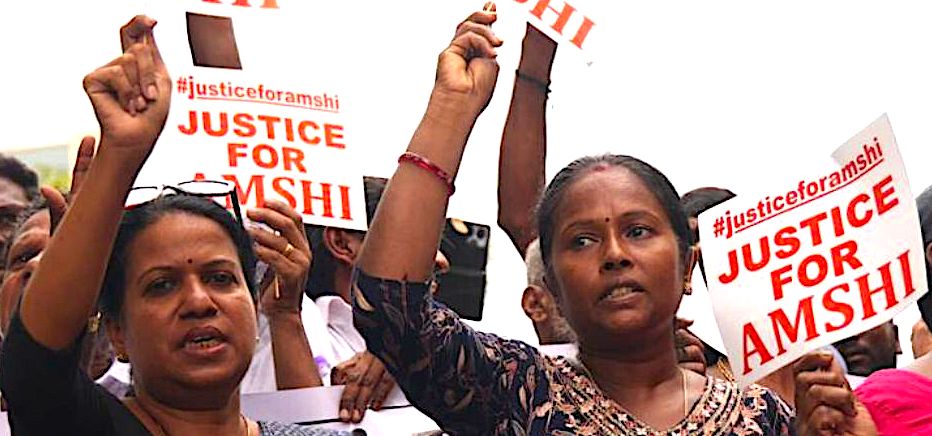Photo by Noopura Liyanage
“I want to reaffirm Sri Lanka’s commitment to upholding human rights, gender equality, and social justice…our foremost priority is to ensure that no one is left behind – especially women, children, marginalized communities, and those most vulnerable in our society. We believe that meaningful change is rooted in systemic transformation and collective action, and we look forward to working alongside all stakeholders…” Minister Saroja Paulraj at CEDAW Feb 2025.
Within hours of the news of the suicide of the 16 year-old girl breaking, Prime Minister Harini Amarasuriya and Minister Saroja Paulraj issue a joint public statement not sanitized, not bureaucratic, but human. They express deep sorrow, name the alleged perpetrator and acknowledge the systemic failures that allowed this to happen. They do not hide behind “ongoing investigations” but promise transparency and moral accountability. Regardless of political cost, the government distances itself publicly from any individual, including party affiliates, involved in the incident, sending a clear signal: the party will not tolerate complicity.
Had the government responded this way, the tragedy could have become a turning point, not just a headline. It would have signaled a new kind of leadership: one that acts quickly, listens deeply and refuses to protect power at the expense of the vulnerable. Instead the silence, delays and political maneuvering have only deepened the grief and disillusionment.
“We have obtained a JMO [Judicial Medical Officer] report on this alleged incident of sexual assault of the girl in question. I asked the parents of that child to make a formal complaint to the National Child Protection Authority. I even asked them to come and meet me with a petition, but they have not come forward so far. Justice cannot be served through social media” Minister of Women and Children Saroja Paulraj, Parliament, May 9.
Sri Lankans have witnessed plenty of whitewashing and protecting the perpetrator for political preservation. This is why scores of Sri Lankans voted for the NPP, hoping that the party that based its political transformation on being an alternative to the corrupt, power hungry politicians of the past would usher in a turning point. Beautiful life, revolution of love, the village for us and women together were attractive branding statements that pulled voters in. But today they seem to ring hollow, a natural outcome when you can’t translate branding into active policy.
What is more disheartening than the apathy of regimes past who often simply pretended to care for children, women or the marginalized is the betrayal of those who came to power chanting the mantras of progress, empathy and empowerment, only to falter when it mattered most. The NPP was not supposed to be more of the same. It was marketed as a breath of fresh air: clean, educated, progressive, with the masses. Many were drawn in, especially women, by the promise of a politics rooted in justice and collective care.
The prime minister is a former university lecturer. Minister Saroja Paulraj is a teacher by profession. Parliament is dotted with degree holders and professionals. Yet when families cry out in anguish, when children are hurt and when women ask for safety and dignity, not one of these “enlightened” minds seem capable of responding with the most basic human instinct: empathy.
Minister Paulraj, despite her background in education, cannot seem to fathom the trauma, shame and helplessness parents must be experiencing. Her response, or lack thereof, betrays not just political caution but a complete failure of moral imagination. It’s as if she’s forgotten that this movement, this party, was built on the power of people’s voices amplified through social media.
The women of the NPP campaigned under the stirring slogan united as one. But in office they have proven to be inaccessible, just as beholden to the machinery of political preservation as those before them. The women who voted for them, believing they were choosing sisters in arms, now watch in dismay as those same women retreat into the safety of party lines.
It begs the question, what use is an educated parliament if degrees don’t translate into discernment and progressiveness is only a talking point? What good is a party of intellectuals if none are brave enough to challenge the old culture of silence and blame? But maybe that’s the crux of the issue. These were always half-baked ideas, empowerment without real power sharing, empathy without deep listening, progressiveness that doesn’t risk offending the patriarchal status quo.
This moment is an indictment. Not just of one party or one minister but of an entire political culture where good intentions are enough to get you elected but never enough to govern with integrity.
